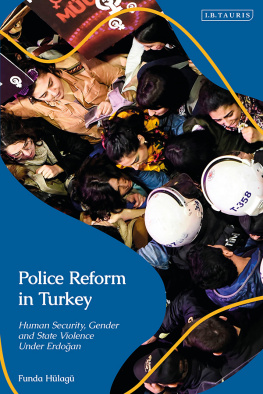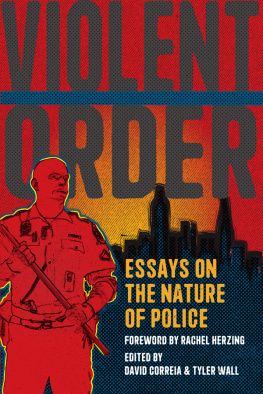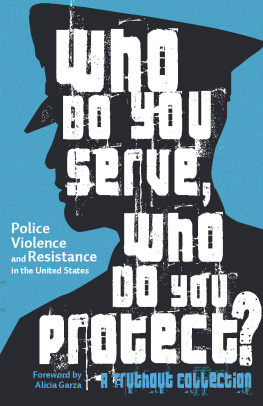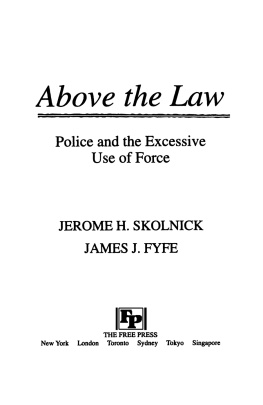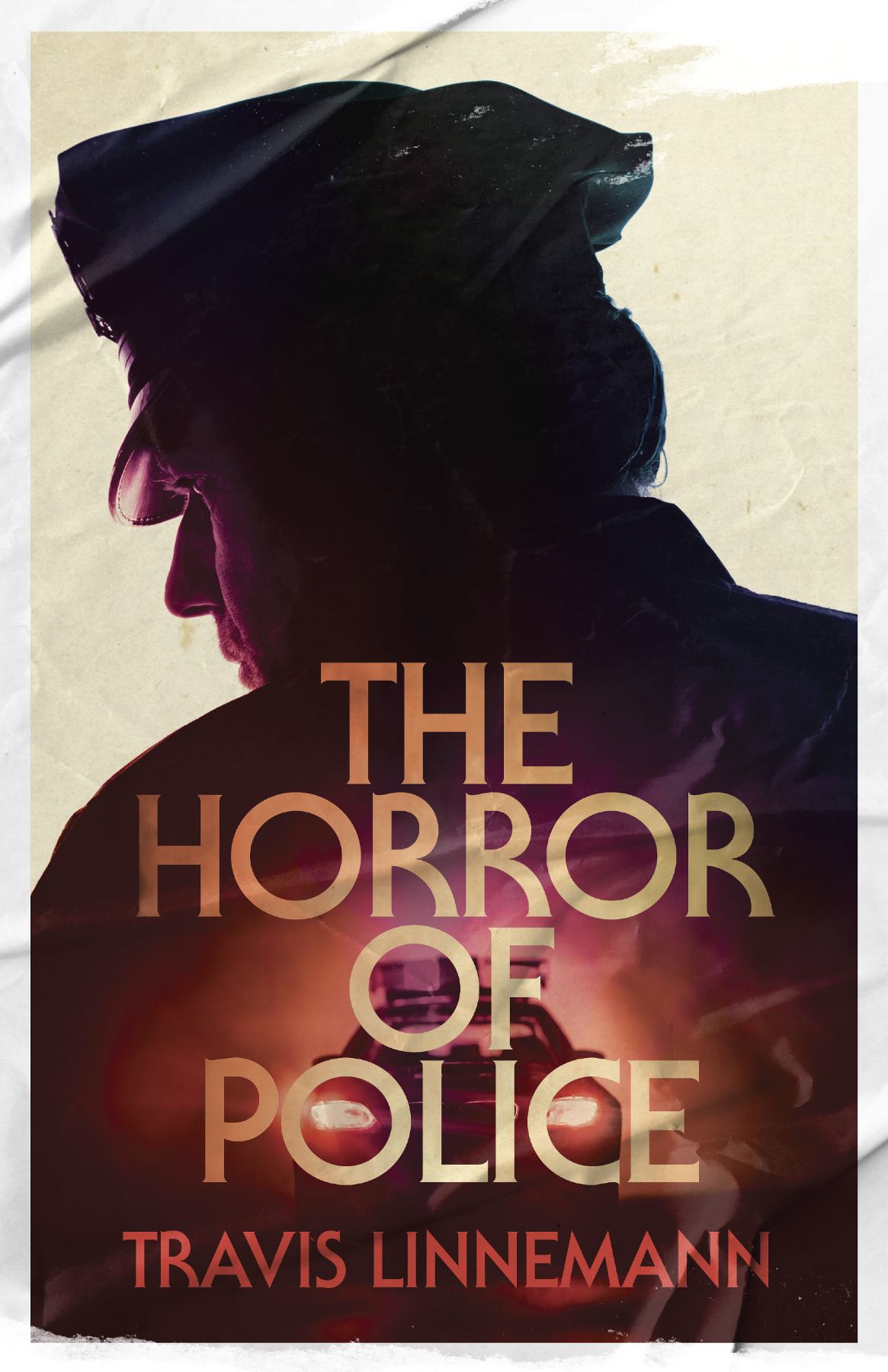
The Horror of Police
The Horror of Police
Travis Linnemann

University of Minnesota Press
Minneapolis | London
Cover design by Michel Vrana
Cover art: (police officer) Syldavia / iStock.com; (background) Zeferli / iStock.com; (car) copyright Ilkin Guliyev / Dreamstime.com
Portions of chapter 1 were originally published as Bad Cops and True Detectives: The Horror of Police and the Unthinkable World, Theoretical Criminology 23, no. 3 (2019): 35574. DOI: 10.1177/1362480617737761.
Every effort was made to obtain permission to reproduce material in this book. If any proper acknowledgment has not been included here, we encourage copyright holders to notify the publisher.
Copyright 2022 by the Regents of the University of Minnesota
All rights reserved. No part of this publication may be reproduced, stored in a retrieval system, or transmitted, in any form or by any means, electronic, mechanical, photocopying, recording, or otherwise, without the prior written permission of the publisher.
Published by the University of Minnesota Press
111 Third Avenue South, Suite 290
Minneapolis, MN 55401-2520
http://www.upress.umn.edu
ISBN 978-1-4529-6763-9 (ebook)
Library of Congress ebook record available at https://lccn.loc.gov/2021062905
The University of Minnesota is an equal-opportunity educator and employer.
Any real change implies the breakup of the world as one has always known it, the loss of all that gave one an identity, the end of safety. And at such a moment, unable to see and not daring to imagine what the future will now bring forth, one clings to what one knew, or thought one knew; to what one possessed or dreamed that one possessed.
James Baldwin (1956)
Contents
Police Story, Horror Story
Hell is truth seen too late.
Unknown
The Haunting of Hill House, one of Shirley Jacksons best-known and most beloved works, begins with a sentence placed by some among horror fictions finest: No live organism can continue for long to exist sanely under conditions of absolute reality; even larks and katydids are supposed, by some, to dream. With this simple, foreboding line Jackson breezes past the schlock of blood and gore, nudging her readers toward the edge of an unthinkable abyss. Without the sheltering provisions of dreams, illusions, and self-spun fictions, she warns, the actual conditions of this world would surely deliver all living things to madness.
Dread and menace sitting just behind the familiar: this is the place from which horror fiction begins. Bloodcurdling revelation, the genres remuneration. Who could have known that the missing and murdered were taken by a man turned wolf by moonlight? Who would have admitted the peculiar lord fed on the actual blood of the poor? A black screen on which to project our innermost fears, the genre, like the impenetrable night, is home to monsters of all kinds. But the cause of our dread, as Jacksons exquisite sentence reminds, is not only the monsters that inhabit the unknown night but the unknown itself, the creeping suspicion that the world and our place within it are not as certain as they seem. In this space between what appears and what is, as Tariq Goddard and Eugene Thacker caution, lies horror. While this book is no work of fiction, a step into this strange liminality initiates it as well.
In 1988, the prolific American director John Carpenter released his eleventh theatrical film, They Live. Part science fiction, part horror, the film imagines a dystopian future Los Angelesnot unlike the present onewhere obscene inequality and class division are managed by a twinning of ideology and open violence. Wandering into town looking for work, the films protagonist, a Joadian drifter named John Nada, passes a street preacher who casts a menacing tone:
They use their tongues to deceive you.
Venom is on their lips.
Their mouths are full of bitterness and curses.
The fear of God is not before their eyes.
They have taken the hearts and minds of our leaders.
They have blinded us to the truth.
Our human spirit is corrupted.
Why do we worship greed?
Outside the limit of our sight theyre feeding off us.
Perched on top of us from birth to death are our owners.
They have us. They control us.
They are our masters.
Wake up.
Theyre all around you.
Joining a band of rebels wise to the sinister workings beneath the citys slick veneer, Nada does indeed wake up. He dons glasses that interrupt a mesmerizing signal and sees for the first time the enemy who has enslaved humankind with the skill and precision of Madison Avenue. Like the subliminal ads that urge moviegoers to Drink Coca-Cola and Eat Popcorn, the glasses reveal commands to Obey and Consume behind the ordinary texts of billboards and commercials. On the street, Nada confronts the grotesque faces of alien invaders cloaked behind the figment humanity of cops and the business class.
As is the wont of Hollywood films, Nada and the rebels win out and, by unmasking the monsters that surround them, move their kind nearer to a truer, albeit horrifying, reality. Decades on, the films satirical take on the gross self-interest of the Reagan era remains a popular device with which to illustrate the critique of ideology, showing as it does the shackles of false consciousness slipped by revolutionary ideas and action.
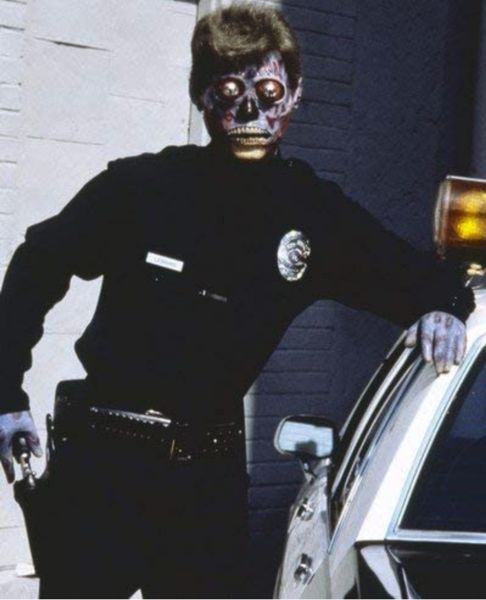
LAPD officer in They Live.
We begin here not only to prefigure the thematic horror evident in the books title but to introduce its central premise. Taking Jacksons and Carpenters cues, from the whimsical and even puerile pages and films of popular horror we draw a dead-serious question: What is hidden from viewor rather, what provisions have we made to shelter our own minds from that which is too terrifying to confront? Fit to the perennial problems of police, this question hints at horrifying answers indeed. What horrifying reality have we placed beyond the limits of our own sight? From what terrible truth do we retreat?
Peering through this refracted motif, The Horror of Police purposely misreads our vernacular police storiestelevision, film, literature, news media reportage, government reports, academic literature, the words and deeds of police themselvesnot as comforting tales of innocence avenged and order restored but as horror. And from that, dear reader, I begin by asking you to consider the menace hiding behind this familiar world of ours. If we are able to make this great leap together, it becomes possible, perhaps certain, that we will find monsters in our midst.
Cook em, Danno
In late October 2012, a six-year veteran of the New York City Police Department, Gilberto Valle, was arrested by the FBI and later charged in New Yorks Southern District Court with conspiracy to kidnap and improper access of the National Crime Information Center database. While the charges were serious, what gave this previously anonymous cop his proverbial fifteen minutes was prosecutors also alleging he had shared plans to kidnap, rape, torture, kill, cook, and eat women with members of several online fetish communities. Officer Valle came to the attention of the FBI after his young wife, suspecting an affair, installed spyware on their shared computer and uncovered a trove of shocking material, including images of sexual torture; chat logs from the website Darkfetishnet.com detailing his plans; online searches for how to tie someone up, how to make chloroform, and how to prepare human meat; profiles of nearly one hundred potential victims; and a veritable blueprint mapping the machinations of the self-described aspiring professional kidnapper. In one of the many conversations discovered by his wife, Officer Valle, writing under the handle
Next page

